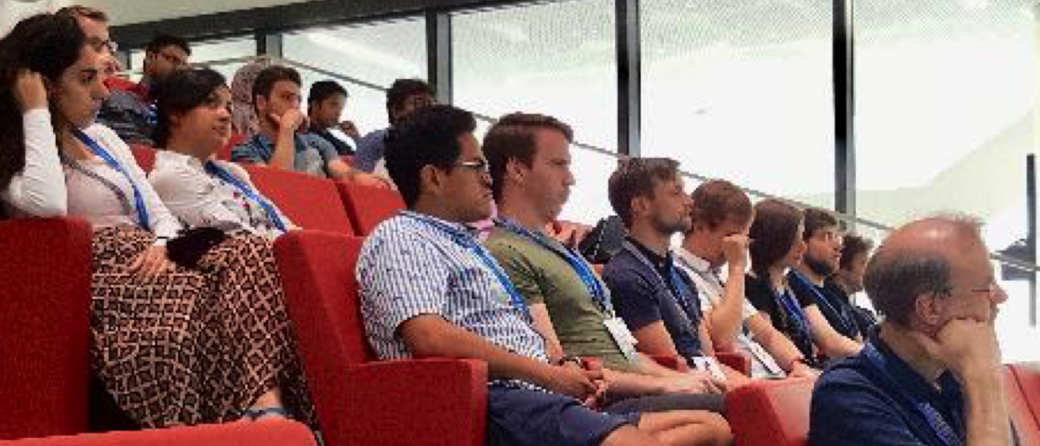The Graduate School of BioEngineering (GSB) summer school brings together doctoral candidates from various departments at the Technical University of Munich (TUM). The scientists work in the fields of medical physics, medical informatics and robotics.
Anyone examined with magnetic resonance tomography or treated with modern radiation therapy benefits from the results of close collaboration among experts in a variety of specialty fields: medicine, physics, informatics and engineering sciences. And those at TUM who work with topics such as medical physics, medical informatics or other aspects of bioengineering find partners in dialog and collaboration spread among various departments at the university.
At TUM a separate specialized graduate school, the Graduate School of BioEngineering (GSB), promotes this interdisciplinary exchange among doctoral candidates. In contrast to most graduate schools it is not tied to a particular department, but rather connects students with related research topics from different departments. 53 doctoral students are currently registered at the GSB, including 10 women. The participants are from 20 different countries and are enrolled at five different TUM departments.
Networking at a science retreat
The GSB's interdisciplinary approach is visible in particularly compact form at the annual summer school, a kind of science retreat where the doctoral students get together for three days at an idyllic and secluded location. This year's summer school was held from July 1 to 3 at the conference center Haus der Bayerischen Landwirtschaft in Herrsching at the Ammersee near Munich. Members of the Advanced Medical Physics for Image-Guided Cancer Therapy research training group participated for the first time. The group is a joint initiative of the Ludwig Maximilian University of Munich, TUM and the Helmholtz Zentrum München.
Experienced researchers presented their fields of expertise to create an overview of the various topic areas of bioengineering; in addition to these presentations there were interdisciplinary elements such as a workshop on good scientific practice and an excursion to the medical technology company BrainLab. The students were also able to present their own research in a poster session.
Dissertation projects: Clear perspectives for surgeons and early cancer diagnosis
Two examples illustrate the variety of the dissertation projects presented:
Jakob Weiss studied Informatics at TUM and is working on a procedure that will support ophthalmic surgeons operating on the retina. Here in the future the area of the operation will be constantly examined using Optical Coherence Tomography; Weiss is developing software that uses the data captured in the process to generate precise three-dimensional images in real-time which can be rendered on a screen or using virtual reality glasses thus providing surgeons with essential additional information. "I'm focusing on retinal surgery because it requires a particularly high level of precision and today physicians only have a very limited view through an endoscope," says Weiss in describing the significance of his work. During his research Weiss is working together closely with optics specialist Carl Zeiss Meditec GmbH.
Parastoo Afshari studied Biomedical Technology in Teheran and is now earning her doctorate at the Institute of Biological and Medical Imaging (IBMI) of the German Research Center for Environmental Health Helmholtz Zentrum München and at the TUM Chair of Biological Imaging. She is working on light-based technologies that can detect and visualize changes in the structure and function of fine blood vessels in the early stages of esophageal cancer. Her work is intended to enable earlier detection of cancer and thus to increase the patient's chances of survival. "Today esophageal cancer is usually not diagnosed until an advanced stage, significantly reducing the chances of survival," Afshari observes. Parastoo Afshari has a Marie Skłodowska-Curie grant funded by the EU research and innovation program "Horizon 2020" (grant agreement No. 721766).
Avoiding scientific misconduct
"Is that still alright, or is it actually scientific misconduct?" – This was the central focus of the workshop on good scientific practice that filled an entire morning session of the summer school. For the instructor, Emil Ratko-Dehnert of the TUM unit ProLehre, this was the point of departure for discussing a variety of ambiguous situations from everyday scientific life which may not exemplify absolute compliance, but which are still very far away from plain plagiarism or falsification. Ratko-Dehnert explained to the audience how doctoral candidates can themselves make sure that their conduct is proper; he also recommended that young researchers speak with experienced colleagues or with the TUM Research Integrity Office if they suspect improper conduct on the part of others. Ratko-Dehnert then asked the audience to contribute current questions from their own everyday experience: "So, let's close the doors…then we can speak frankly without anyone listening."
The GSB approach and the summer school was very well received by the participants. Jakob Weiss said: "For me an especially interesting aspect of the summer school was to interact with people from other related subjects and to be able to discuss new ideas in a relaxed atmosphere."
MORE INFORMATION:
- Graduate School of BioEngineering
- Jakob Weiss, Doctoral candidate profile
- Parastoo Afshari, Doctoral candidate profile
- Research training group Advanced Medical Physics for Image-Guided Cancer Therapy
Contact:
Media Relations MSB:
Dr. Paul Piwnicki
Phone: +49 89 289 10808
Email: paul.piwnicki@tum.de
